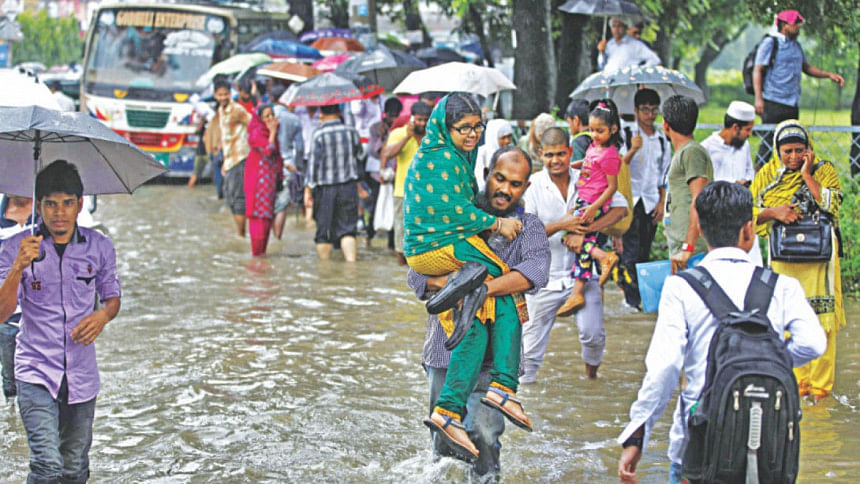Dhaka’s drains, dengue, and denial

What is the capital of Bangladesh known for?
Ask this question on a dry winter morning, and you will hear a chorus: "Biryani!" "Traffic!" "Overpopulation!"—with someone perhaps adding "resilience" as a compliment or a curse. But ask the same question during monsoon season, and the answer will change faster than the city's disappearing footpaths. Dhaka becomes less of a city and more of a soggy simulation—an accidental water park where rickshaws float like Venetian gondolas, and office-goers reenact scenes from Titanic, minus the romance and with the added thrill of catching leptospirosis.
It happens every year—rain falls, drains fail, city halts. And each year, officials act as if the sky has done something outrageously unexpected. "Heavy rainfall was unforeseen," they say, as though clouds haven't been part of the Bangladeshi climate since the Pala Empire. But the real surprise isn't the rain—it's our ever-deepening incompetence in dealing with it.
Take the drainage system. Legends say it exists. The Dhaka South City Corporation claims to maintain 3,000 km of drains. Dhaka North boasts another 1,500 km. That's 4,500 km in total—enough to stretch across Bangladesh from Teknaf to Tetulia multiple times. And yet, when the first heavy downpour arrives, those drains behave like introverts at a party: overwhelmed, unresponsive, and quick to disappear.
The Institute of Water Modelling reported that almost 70 percent of Dhaka's stormwater drains are clogged—choked not only by plastic bags and household waste but also by layers of concrete apathy, construction debris, and the crumbled remains of political promises. These are not drains anymore; they are time capsules filled with everything we have chosen to ignore.
So, when it rains, water doesn't flow. It lingers. It pools in alleyways, reminiscing about the flood from last year, and the year before, and the one before that. You can practically host rowing competitions on Mirpur Road, or perhaps inaugurate a wetland research institute on Panthapath.
This aquatic chaos isn't just a nuisance—it's an open invitation for disease. The Aedes mosquito, that airborne agent of doom, thrives in stagnant water. And Dhaka, during monsoon, becomes its dream honeymoon resort. Flowerpots, construction sites, rooftops, potholes, plastic cups—every puddle is an incubator.
In 2023-24, dengue didn't just visit—it unpacked its bags and moved in. Over 1,700 people died, making it one of the deadliest outbreaks in the country's history. And yet, preventive measures remain as rare as a government meeting that starts on time. Public announcements are made. Sprays are sprayed—often into the air, never the water. And when questioned, health officials fumble between statistics and statements like, "We are taking steps," which in Dhaka's bureaucratese translates to: "We are waiting for the rain to stop and the news cycle to move on."
Meanwhile, as dengue breeds in puddles and rats enjoy their waterfront condos, the people of Dhaka do what they always do—adapt. A woman carrying her baby through waist-deep water in Mohammadpur shrugs and says, "Well, at least it's not hot today." A rickshaw-puller adds an extra Tk 50 for "water surcharge." Foodpanda riders contemplate swimming lessons.
Our coping mechanism? A cocktail of memes, madness, and mild dysentery.
Let's not forget the heroes in this aquatic dystopia: the larvae of the Aedes mosquito. They are the only ones enjoying this weather, gracefully navigating the waterlogged alleys while the rest of us perform delicate acrobatics on brick platforms, balancing between despair and dengue.
Yet, the most haunting image isn't the floating rubbish or the flooded classrooms. It's the silence from institutions that were meant to prevent this. RAJUK, the city's supposed urban planning authority, disappears into the mist every time journalists ask tough questions. In the last decade, not a single major stormwater reservoir has been built. But multi-storey buildings keep rising like mushrooms in monsoon, often without drainage clearance. It's urban development by wishful thinking.
Between 2018 and 2024, the two Dhaka city corporations reportedly spent nearly Tk 1,000 crore on waterlogging and canal-cleaning projects. Yet, with every rain, Dhaka drowns again—quicker than ever. Where did the money go? Some say it evaporated. Others suggest it floated away with the drains. Rumour has it a large chunk was spent on "training" abroad—perhaps to study how Paris or Amsterdam handles its drainage, forgetting that Dhaka has neither its rivers nor its reason.
Transparency International Bangladesh reported that up to 30 percent of urban infrastructure budgets are lost to corruption. That's not a footnote—that's a confession. It's no longer a matter of inefficiency. It's institutionalised failure, propped up by excuses, committee reports, and photo-ops in knee-deep water.
And yet, no one ever seems to resign.
What's more absurd is how quickly the cycle resets. After every "flood," there's a press conference. A "special task force" is declared. The task force holds several "urgent meetings." A thick report is written—possibly water-resistant. It's shelved. A new committee is formed. Consultants are flown in. Samosas are served. Recommendations are made: "elevated walkways," "mobile pumping stations," "awareness campaigns." Then… silence. Until the next monsoon arrives and the entire performance repeats, like a tragic opera directed by Kafka and choreographed by Monty Python.
Accountability, it seems, floats away faster than the floodwater.
This isn't just about governance—it's about the normalisation of dysfunction. When children grow up thinking that a flooded school is normal, that electricity should vanish with the first thunderclap, that mosquitoes are as inevitable as midterms, then we have moved beyond negligence. We have institutionalised absurdity.
And what's our long-term vision? Dhaka, at the mercy of rain, keeps expanding vertically and horizontally with little regard for drainage, green zones, or water reservoirs. The canals that once breathed life into the city have been choked into oblivion. Wetlands have been encroached on by real estate greed. Every bit of concrete laid without planning becomes a future flood zone.
Yet amid all this, we remain resilient. Or is it numb? Maybe both.
There's something heartbreakingly poetic in our ability to carry on. A city submerged in failure, yet floating on sheer stubbornness. A place where people laugh while knee-deep in water because crying won't keep them dry. Where a shopkeeper rescues floating packets of Maggi noodles and tells a passer-by, "Now we sell seafood flavour."
Dhaka doesn't sink. It limps, floats, laughs, and curses. It becomes a case study in how a city can grow without growing up.
So, bring the rain. Let the clouds burst and the rivers rise. Let the drains hide in shame. Let Dhaka drown again, not because it has to—but because it always does.
Because in this city, infrastructure is seasonal, promises are waterproof, and accountability is amphibious.
We will endure. Not because we are prepared, but because we have no other choice.
So, dear Dhaka, until the next monsoon: keep your raincoat, your boots, your memes, and your gallows humour. Above all, keep your hope afloat. Because, in the city of waterlogged dreams, hope is the only thing we haven't learned to drain.
H.M. Nazmul Alam is an academic, journalist, and political analyst. He can be reached at [email protected].
Views expressed in this article are the author's own.
Follow The Daily Star Opinion on Facebook for the latest opinions, commentaries and analyses by experts and professionals. To contribute your article or letter to The Daily Star Opinion, see our guidelines for submission.

 For all latest news, follow The Daily Star's Google News channel.
For all latest news, follow The Daily Star's Google News channel. 











Comments